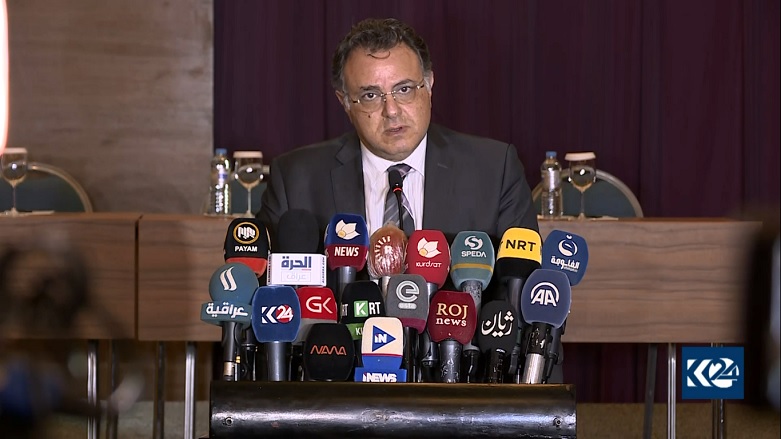WHO congratulates Kurdistan Region on coronavirus response

ERBIL (Kurdistan 24) – The World Health Organization (WHO) in Iraq applauded the Kurdistan Region's ongoing response to the coronavirus pandemic on Tuesday, pointing out the stark contrast to the relatively small number of known infections in the autonomous region when compared with the rest of Iraq.
"I want to congratulate the Kurdistan Region on their achievement in fighting the coronavirus," said the organization's representative to Iraq, Dr Adham Ismail, during a press conference held in Erbil.
He added, "The rate of COVID-19 infections and fatalities in the region is very low compared to other Iraqi governorates, but its threat is not over," stressing that the organization is ready to provide technical support to the region in limiting further outbreaks of the deadly virus.
"The number of cases is not out of control, and we have not reached the stage of high casualties in Iraq," he explained, "We can no longer pressure the economy and that is why Iraq resorted to a partial ban of movement so that people can work."
Regarding the WHO's future recommendations for the Kurdistan Regional Government (KRG) for its management of anti-coronavirus efforts, he said, "We will monitor the situation for the next two weeks, and the lifting of the lockdown should be gradual, and if we notice a decrease in new cases of coronavirus in Iraq, we will move to lift the partial ban on flying and other sectors."
Ismail warned that, if no vaccine is found to treat the virus, there will likely be a second wave of infections, "and it will be stronger than the current one."
He recommended that all provinces and regions in Iraq must prepare for such an eventuality, and should establish proper quarantine facilities instead of makeshift ones in hotels and other buildings that were hastily converted as the number of cases rose.
In late March, another WHO official in Baghdad on Thursday praised the KRG's quick early response to coronavirus outbreaks, enacting curfews and restricting public gatherings, among many other measures.
Read More: WHO praises Kurdistan Region’s anti-coronavirus efforts
“The citizens in the Kurdistan Region are more committed to the instructions, especially concerning the curfew, in comparison to the other Iraqi provinces,” said one of the group's officials based in Iraq.
So far, there have been 1,928 confirmed cases of the coronavirus in Iraq, 366 of them in the Kurdistan Region, and a total of 90 deaths. Only five of the fatalities have occurred in areas under the jurisdiction of the KRG.
The highly-contagious disease was first reported by Chinese authorities in late 2019 and has since spread in over 180 countries worldwide. To date, it has infected over 3 million people and killed nearly 214,000, according to government-reported data compiled by Johns Hopkins University. The actual figures could be dramatically higher due to insufficient testing capabilities or underreporting, particularly in countries that have weak health systems.
Editing by John J. Catherine
